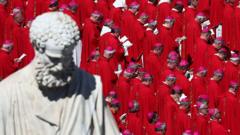The Vatican's conclave promises to deliver a new Pope while enforcing stringent secrecy protocols among its voters and staff.
Conclave: A Closer Look at the Vatican’s Secluded Electoral Process

Conclave: A Closer Look at the Vatican’s Secluded Electoral Process
As 133 Cardinals Prepare for the Papal Election, Secrecy Reigns Supreme in the Conclave
In just a few days, the eyes of the world will turn to Rome, where 133 Catholic cardinals are set to convene in the historic Sistine Chapel to elect a new pope, marking a moment steeped in solemnity and secrecy. Each cardinal participates after taking a binding oath to maintain absolute silence regarding the specific proceedings of the conclave for the rest of their lives. This principle extends to all individuals within the Vatican during the event—from medical personnel to kitchen staff—who are equally sworn to uphold the promise of secrecy.
To safeguard this confidentiality, extensive security measures are implemented. The Sistine Chapel and its accompanying guesthouses will be meticulously checked to ensure they are devoid of any listening devices, with electronic jammers in place to prevent any phone or wireless communication. John Allen, editor of the Crux news site, underscores the importance the Vatican places on this isolation. "Total lockdown" means that upon entering the conclave, cardinals must surrender all digital devices, and there are stringent restrictions on media access, ensuring the focus remains entirely on the spiritual decision at hand.
While the sealed environment is designed to protect against interference from external forces, it also aims to eliminate potential political influences. The cardinal-electors will be away from televisions, newspapers, and radios, creating an atmosphere conducive to divine guidance. Monsignor Paolo de Nicolo, a long-serving official, articulated that there would be no outside distractions, as even windows remain closed to maintain isolation from the external world.
As the conclave approaches, the mood outside is buoyant with speculation about potential candidates to succeed Pope Francis. Although the cardinals refrain from official commentary, their movements have not escaped the watchful eyes of journalists and curious onlookers; many are on a 'cardinal hunt.' Local newspapers have provided coverage filled with tantalizing tidbits, chronicling sightings of cardinals before the official commencement of the conclave.
This fervent media attention is not without its consequences. As various factions lobby for their preferred successors, it becomes clear that the election bears substantial influence—not just within the Catholic Church but on global events and policies. The expectations placed on the new pope are enormous, considering the Church's extensive engagement with moral issues and conflict resolution around the world.
As cardinals gather in secrecy ahead of the vote, the notion of a spiritual decision remains central. Ines San Martin, a representative from the Pontifical Mission Societies, emphasizes the belief that the Holy Spirit shapes the choices made within the conclave. However, amidst the whispers and deliberations, alliances and preferences also emerge. John Allen remarks on the significance of trust among the cardinals, while acknowledging that some external voices attempt to influence the process.
Ultimately, by early Wednesday, the cardinals will be safely ensconced in the Vatican, disconnected from the world and focused solely on the sacred duties at hand. As they rely on their experience and internal discussions, the election of the next pope will undoubtedly carry profound implications for the Church and its place on the global stage.
To safeguard this confidentiality, extensive security measures are implemented. The Sistine Chapel and its accompanying guesthouses will be meticulously checked to ensure they are devoid of any listening devices, with electronic jammers in place to prevent any phone or wireless communication. John Allen, editor of the Crux news site, underscores the importance the Vatican places on this isolation. "Total lockdown" means that upon entering the conclave, cardinals must surrender all digital devices, and there are stringent restrictions on media access, ensuring the focus remains entirely on the spiritual decision at hand.
While the sealed environment is designed to protect against interference from external forces, it also aims to eliminate potential political influences. The cardinal-electors will be away from televisions, newspapers, and radios, creating an atmosphere conducive to divine guidance. Monsignor Paolo de Nicolo, a long-serving official, articulated that there would be no outside distractions, as even windows remain closed to maintain isolation from the external world.
As the conclave approaches, the mood outside is buoyant with speculation about potential candidates to succeed Pope Francis. Although the cardinals refrain from official commentary, their movements have not escaped the watchful eyes of journalists and curious onlookers; many are on a 'cardinal hunt.' Local newspapers have provided coverage filled with tantalizing tidbits, chronicling sightings of cardinals before the official commencement of the conclave.
This fervent media attention is not without its consequences. As various factions lobby for their preferred successors, it becomes clear that the election bears substantial influence—not just within the Catholic Church but on global events and policies. The expectations placed on the new pope are enormous, considering the Church's extensive engagement with moral issues and conflict resolution around the world.
As cardinals gather in secrecy ahead of the vote, the notion of a spiritual decision remains central. Ines San Martin, a representative from the Pontifical Mission Societies, emphasizes the belief that the Holy Spirit shapes the choices made within the conclave. However, amidst the whispers and deliberations, alliances and preferences also emerge. John Allen remarks on the significance of trust among the cardinals, while acknowledging that some external voices attempt to influence the process.
Ultimately, by early Wednesday, the cardinals will be safely ensconced in the Vatican, disconnected from the world and focused solely on the sacred duties at hand. As they rely on their experience and internal discussions, the election of the next pope will undoubtedly carry profound implications for the Church and its place on the global stage.



















